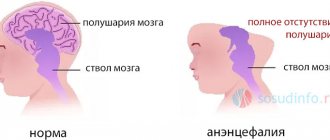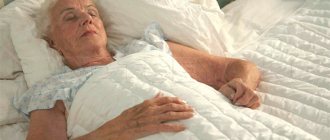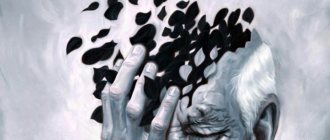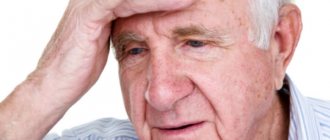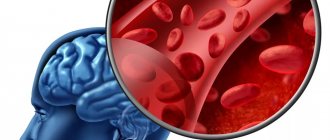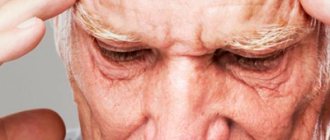Dementia is an insidious disease that develops against the background of brain atrophy and leads to a gradual change in the personality core. The disease, with the exception of rare cases, is incurable, but its development can be slowed down and its course alleviated if timely medical help is sought and treatment is prescribed correctly.
However, this is rarely possible - the reason lies in the paucity of the first symptoms, and in senile dementia they are similar to the natural processes of aging. The second important reason is the lack of knowledge that would allow one to identify the signs of the onset of dementia and consult a doctor in time for treatment.
Who is at risk for dementia
Experts recommend that those who are at risk or live with relatives belonging to it be required to study the symptoms and signs of dementia. Most often these are people:
- Over the age of 60-65 years;
- After a traumatic brain injury;
- With cardiovascular diseases (hypertension, heart attack, stroke);
- Obese;
- With endocrine pathology.
Also at risk are those who lead a sedentary lifestyle, avoid mental and physical stress, have bad habits or uncontrollably take psychotropic substances. Close relatives of those who suffered from this disease should pay attention to the possibility of developing dementia, since scientists have proven a hereditary factor.
Diagnostics
First of all, the diagnosis of the disease is carried out on the basis of the clinical picture, or, more precisely, the presence of cognitive and neurological defects in it. They significantly poison the patient’s life and do not disappear even with clear consciousness.
Correctly identifying symptoms, and subsequently prescribing effective treatment, allows timely diagnosis. Thanks to visual research methods, it has become very simplified, and this makes it possible to recognize the pathology in a timely manner without delaying treatment.
Among these methods are prescribed:
- MRI, CT;
- angiography, which allows you to assess the condition of blood vessels;
- rheoencephalography, which determines blood filling of blood vessels;
- EEG, which records the bioelectric signals of brain cells;
- nuclear resonance imaging, visualizing white matter, etc.
Consultations with related specialists are required: neurologist, cardiologist, psychiatrist. Blood pressure is systematically monitored.
First signs of illness
Dementia can occur in different ways, depending on the cause of its occurrence, the location of the pathological process, and the stage of severity. The main signs of dementia appear already at the first stage, but in almost 90% of cases they go unnoticed by others. At the onset of the disease, the patient himself notices a number of changes, but does not attach due importance to them, considering them signs of fatigue, depression, or natural causes associated with the aging process. Subsequently, due to changes in mental activity and perception, the patient ceases to recognize and recognize his illness.
Regardless of the type of dementia, in general, the following symptoms and signs of dementia can be identified:
- Memory problems. They begin with ordinary forgetfulness, the inability to remember minor information: the name of a new acquaintance, the location of the keys, a recent conversation. Further, professional memory suffers, gradually the first symptoms and signs of senile dementia are aggravated by memory failures, while the person tries to reconstruct the course of events, remember what happened, filling in the gaps with fictitious stories and facts. This point distinguishes dementia from ordinary forgetfulness. In a severe stage of the disease, memory is completely lost, a person does not recognize relatives (children, parents), and sometimes - his own reflection in the mirror.
- Impaired thinking and concentration are also signs of incipient dementia. The patient's thoughts are disordered, it is difficult to concentrate on one thing, thinking is slow, clouded, the logic of judgment gradually disappears. In the later stages of the disease, a person thinks fragmentarily, false ideas arise (phobias, persecution mania, poisoning, etc.).
- Speech disorders. Just like thinking, the patient’s speech suffers: in the early stages it is characterized by many errors, and sometimes the logical chain of the story is lost due to forgetfulness. At a later stage, speech is incoherent, even to the point of producing meaningless sounds.
- Emotional disorders. They begin at the first stage and are characterized by frequent mood swings, tearfulness, moodiness, apathy, and asociality, which is why the disease is sometimes confused with depression. At later stages, panic, unreasonable anxiety, and aggression appear.
- Sleep disorders. This symptom is characterized by a gradual loss of biorhythms (daytime sleep, night wakefulness).
- Loss of sense of time and place. The patient forgets the day of the week, the year, cannot distinguish the time of day, and gets lost in a previously familiar area.
As already mentioned, signs of dementia in old people depend on the type of disease and the location of the pathological process. Thus, with dementia of the Alzheimer's type, memory suffers the most, false memories appear, speech disorders occur, and the ability to orientate in space is lost.
Vascular dementia, which accounts for 10-20% of all cases of the disease, occurs due to brain atrophy due to impaired blood supply. Signs of vascular dementia: a sharp decrease in mental activity, intelligence, fatigue, emotional disorders, impaired thinking and speech. Memory problems may not occur.
Also, the clinical manifestations of vascular dementia depend on the location of the lesion in the brain (hippocampus - impaired attention, memory; striatum - motor dysfunction; thalamus - meaningless speech).
Important! In 10% of cases, dementia is aggravated by various psychoses.
Differences between signs of dementia and other diseases
Dementia in old age is often mistaken for the processes of withering that occur in the body after 70-80 years. In this case, the combination of symptoms and their progression should alert relatives who observe suspicious symptoms.
The difference between dementia and natural decline of the body
| Defeats | Senile dementia | Natural processes |
| Memory | First of all, the loss of short-term memory, while events of the distant past are remembered in detail. Also important signs and manifestations of dementia are fantasies and fictions that replace new memories. Another difference is the loss of professional skills | Loss of up to 20% of short-term memory, combined with forgetting past events. At the same time, acquired skills are not lost. |
| Emotions | Unreasonable changes in character that progress | Depression, apathy, irritability, and tearfulness may occur. However, such manifestations are not constant and have reasons (loneliness, resentment, etc.) |
| Intelligence | Gradual decline. The main distinguishing symptom is the inability to perceive, remember new information, and acquire new skills. | Decrease, against the backdrop of maintaining previously acquired skills. But the readiness and ability to learn and remember new information remains |
Since dementia sometimes occurs in young people and children, the disease is mistakenly associated with mental retardation. To distinguish between these diagnoses, it is worth highlighting the main signs of mental retardation and dementia. The first disease is congenital and manifests itself at the age of 2-3 years. Children born with mental retardation lag behind their peers in mental and physical development. Dementia at this age most often occurs as a result of injuries, children are physically healthy, in addition to decreased mental activity, other characteristic symptoms appear, and the disease progresses.
The first signs of dementia in women
Women are much more likely to suffer from dementia than men. This is because about 50-60% of all cases of dementia are associated with Alzheimer's disease, which mainly affects women. In addition, the long life expectancy of female representatives also affects (the disease in most cases occurs after 60-70 years).
At the same time, the symptoms and first signs of senile dementia are easier to identify in women than in men. This is explained by the presence of a greater number of symptoms: patients are much more likely to experience emotional disorders, memory loss with the replacement of information with false memories.
The patient's mood can change very often and dramatically. The most typical manifestations are aggression, irritability, capriciousness, vulnerability, tearfulness, and greed. Closedness is noted, the woman stops communicating with friends and sometimes even relatives. There is no improvement in the emotional background; without treatment, the disease constantly progresses.
Signs of dementia in men
Most often, the first signs of dementia in men are disturbances in speech, thinking, and memory. Due to the localization of the lesion, nonspecific symptoms may develop: tremor, disturbances in purposeful movements. Emotional lability (frequent mood swings) is detected much less frequently than in women. Relatives may suspect the presence of the disease by an increasing decline in cognitive functions, and sometimes by unreasonable aggression or jealousy.
According to studies conducted in the USA, although the disease begins earlier in men (from 60 years of age), the first symptoms and signs of dementia appear later in men than in women. For this reason, the disease can rarely be detected at an early stage, and in some cases it remains undetected until the last stage.
Signs of the disease in young people
At a young age, dementia manifests itself in the same way as at an old age, but its prognosis is slightly more favorable. This is explained by the fact that young people more often seek help from specialists when the first signs of illness appear, as well as in connection with other causes of dementia. For example, in case of injuries, brain tumors, lack of vital vitamins and minerals, or hormonal imbalances, the progression of the disease can be completely stopped.
Symptoms and signs of dementia in young people are increasing forgetfulness, problems with thinking and speaking, concentrating, and the inability to focus and do normal work. All this leads to depression, loss of interest in life, withdrawal from society, and aggression.
Reference! Dementia in young people is registered relatively rarely; in different countries this figure reaches 1-10% of the total number of cases.
How to make a diagnosis
To identify dementia, diagnostics are required, which includes consultations with doctors of various specialties, laboratory and instrumental tests. The diagnosis of senile dementia is often made incorrectly, since it may not be possible to confirm it (brain scans are not performed to save money).
Examination and history taking by a neurologist
At the stage of initial contact with a doctor, complaints from the patient and his relatives are collected, and the state of the patient’s nervous system is analyzed. For this purpose, neurological tests are carried out, during which a person’s motor activity, reflexes, and sensitivity are analyzed.
Such a simple study allows you to determine whether there is damage to the cerebral cortex, subcortical structures or peripheral nerves. Already during the initial examination, the doctor may suspect the presence of dementia and its cause: it appeared due to structural changes in the nervous tissue or due to age-related metabolic disorders.
To assess the patient's cognitive abilities, special tests are performed:
- 6CIT is one of the most reliable ways to identify thought process disorders;
- MIS is a test that helps identify memory impairment;
- Raven's test - identifies signs of cognitive impairment in older people;
- Beck scale - helps to determine the emotional state of the patient (one of the signs of dementia is a sharp change in mood and temperament);
- night sleep quality scale;
- simple graphic tests (ask you to draw a clock, geometric shapes, write phrases, etc.).
Consultations with doctors of related specialties
After the examination, the neurologist refers the patient to other specialists for a detailed examination. It helps to assess the general condition of the patient’s body and identify the cause of cognitive decline.
First of all, the patient should be examined by a therapist. It identifies signs of cardiovascular diseases, hypovitaminosis, and neoplasms that can provoke the appearance of signs of dementia.
To do this, it is necessary to assess the condition of the digestive tract, heart, blood vessels, kidneys and liver, since these processes affect their work. To objectively assess the functions of internal organs, it is necessary to conduct laboratory tests and instrumental tests.
Laboratory and instrumental diagnostics
Analyzes and instrumental studies are the final stage of diagnosis, the results of which confirm or refute the preliminary diagnosis.
Necessary studies for diagnosis of dementia and differential diagnosis
| Type of study | Pathologies that it helps to identify |
| General blood analysis | Anemia, inflammatory processes, blood diseases (leukemia) |
| Blood chemistry | Impaired kidney and liver function, digestive problems |
| Ultrasound of the abdominal organs | Structural changes in the liver, kidneys, pancreas |
| Angiography of cerebral vessels | Pathologies of the vascular bed that lead to impaired blood circulation and metabolism in the central nervous system (atherosclerosis, strokes, hypertension, etc.) |
| CT or MRI of the brain | Brain neoplasms, signs of degeneration of the cortex or subcortical structures |
Based on these research methods, the doctor makes a diagnosis of dementia or rejects it. If dementia is caused by another disease (hypertension, atherosclerosis, neoplasms, Alzheimer's or Parkinson's disease), then treatment of the primary pathology is carried out. With successful therapy, symptoms of dementia decrease or disappear altogether.
The diagnosis of vascular dementia is established in the presence of circulatory disorders in the brain. This occurs due to deterioration of vascular patency by blood clots, atherosclerotic plaques, or compression by tumors.
If the examination does not reveal a pathology that can lead to a decrease in mental abilities, then a diagnosis of senile or idiopathic (the cause is unknown) dementia is established. Then the treatment is aimed at supporting blood circulation and metabolic processes in the tissues of the central nervous system. Such treatment cannot completely eliminate the disease; it only reduces the rate of development of changes and improves the patient’s quality of life.
Signs of the disease in the second and third stages
In addition to the symptoms described above, in the second and third stages of the disease, household skills gradually disappear. A sick person cannot prepare food, forgets to close the refrigerator, and leaves the house leaving the door open. The skill and desire to take care of oneself is lost: washing, changing clothes.
In case of damage to the diencephalon and midbrain, hallucinations, confusion, and loss of the sense of time may appear.
Also, signs of the last stage of dementia may include various motor disorders: inability to maintain balance, tremors of the limbs, loss of praxis (the ability to perform purposeful motor acts). Three stages of dementia and the main distinguishing features
| First stage | Second stage | Third stage |
| Loss of professional skills | Loss of simple skills, inability to use most household appliances, neglect of personal hygiene | Loss of all skills, inability to repeat simple actions, sometimes even move and eat |
| Minor emotional changes (these signs of dementia are especially common in older women) | Emotional changes: apathy, depression | Complete destruction of the personal core |
| Forgetfulness is noted | Short-term memory suffers | Loss of memory, disorientation in space, time and even self-identity |
Such serious disorders as complete loss of personality, the inability to remember one’s own name, face, orient oneself in space and time, as well as the loss of the ability to independently take food and water can be interpreted as signs of death with dementia, which will soon occur.
Important! Starting from the moderate stage of dementia, the patient may refuse to eat or, conversely, eat more than necessary. This is due to the loss of short-term memory and the inability to correctly sense hunger or satiety.
Treatment
Modern neurology considers dementia not as an independent disease, but as a syndrome, a set of certain conditions. And if a cure for the disease itself has not yet been found, then its components are quite amenable to correction if it is started on time.
In the arsenal of doctors at the Yusupov Hospital there are anti-dementia drugs, drugs that improve cerebral circulation, transmitters, drugs based on peptides, amino acids, and biologically active substances. Drugs are used to relieve negative symptoms of aggressive agitation, depression, insomnia, and psychosis. Vitamin complexes and injections from animal brain tissue extracts support brain trophism. It is important to treat somatic diseases: heart, blood vessels, diabetes, obesity; these measures mitigate the manifestation of dementia and Alzheimer's disease.
Symptoms that a doctor can identify
If a patient exhibits signs that may indicate the development of dementia, it is very important not to delay contacting a specialist. The doctor will accurately determine the first symptoms of the disease, using, in addition to interviewing the patient and his relatives, a number of diagnostic tests in order to confirm or refute the disappointing diagnosis.
At the appointment, questions must be asked that help identify the initial signs of dementia in women or men:
- when the first manifestations were noticed;
- what signs were identified by relatives;
- how the patient navigates in space and time;
- is there a loss of short-term memories (three blocks of memory are tested, but the loss of short-term memory is of greatest importance);
- Are there any changes in speech and its perception?
A person can also take intelligence tests to test their ability to perform specified actions (praxis).
Tests that detect dementia
Experts often use a test to look for signs of dementia in women or men. There are several such tests:
- SAGE - a questionnaire that allows you to identify problems associated with memory and intelligence;
- Mini-cog – task of repeating words after a specialist;
- MMSE is a very effective test that allows the doctor to see the overall picture and identify any disturbances in perception, memory, thinking, and speech.
- The Montreal Cognitive Function Rating Scale is considered one of the newest and most accurate tests.
A clock test is also often used, where the patient needs to accurately depict the time value indicated by the doctor. This test is simple and accessible, but does not always show early signs of dementia in older people.
Laboratory methods
Using laboratory methods, not only the presence of the disease is checked, but also its stage and type of lesion. In a severe stage of the disease, the doctor may also notice signs of imminent death in dementia.
Among laboratory methods, the most accurate are brain examinations using CT and MRI. Sometimes the electroencephalography method is used, which shows the activity of different parts of the brain.
Important! If it is necessary to undergo an MRI, the patient or his relatives must notify the doctor about the presence of pacemakers and various implants.
Also, to identify the cause of dementia, a number of additional tests and laboratory tests may be required, for example, biochemical and general clinical blood tests. These tests are prescribed by the attending physician, after identifying the symptoms and signs of senile dementia, and treatment based on the results obtained is also prescribed by the doctor.
Forecast
Specialists at the Yusupov Hospital devote a lot of time to disseminating information about neurodegenerative diseases. In lectures, conversations, and issue of thematic bulletins, they try to maintain a positive attitude among their patients, talk about new discoveries, methods of preventing and controlling the disease, and report how persistently men fight Alzheimer’s. For example, former US President Ronald Reagan, who organized numerous funds to combat the insidious disease. It is to Reagan that world science owes the rapid development of research in the field of neurodegenerative processes. And everyone’s favorite Captain Columbo (actor Peter Falk) resisted Alzheimer’s for many years through creativity and learning roles.
Patients are introduced to ways to control the disease - giving up saturated and trans fats, sausages, smoking, drinking alcohol, and relaxing on the couch. To love active physical education, strength exercises, vegetables and fruits, to load and train the brain every day, to study a second or maybe a third foreign language, and be sure to sing and dance. Use any interesting experience. A report has appeared in scientific journals in Europe that in tropical countries the population has almost no dementia. This is due to the high consumption of coconut oil, which is a powerful antioxidant and a drug that dramatically increases the energy activity of the brain. It is worth adopting the experience of tropical residents. Alzheimer's is not scary for the inhabitants of the highlands who live to be a hundred years old with a clear mind. The influence of oxygen deficiency in the mountains on the special aggregative state of the blood, and through it on the synthesis of amyloid proteins, which are deposited inside nerve cells and destroy them, has been clarified. Scientists from research centers around the world have come close to this biochemical solution, and there is hope that the long-awaited cure is just around the corner. And the tragic Alzheimer's, dementia, Parkinson's, amyotrophic lateral sclerosis, multiple sclerosis, cerebral palsy and many other ailments will leave us forever.
Types of dementia
In addition to the division into congenital dementia and acquired dementia, partial dementia is also observed, divided into the following types:
- Epileptic
, the trigger for the development of which is epilepsy. - Vascular dementia
. Atherosclerosis of the brain plays a huge role in its development. - Traumatic
, which is provoked by injuries. - Alcoholic
. Brain damage occurs due to alcohol abuse. - Schizophrenic
. She is accompanied by schizophrenia. - Psychogenic
. It is also called imaginary dementia, which goes away on its own. - Decreased mental level
. In this case, mental activity is weakened only slightly.
Senile dementia
The reasons why dementia develops have not been fully determined. With age, all biochemical reactions in the human body slow down, some fail due to the development of illnesses. Dementia in older people begins to progress gradually. Previously acquired skills are forgotten, and a person is unable to learn new ones, just as he is unable to generalize information, draw conclusions and adequately evaluate himself and others.
Negative character traits come to the fore - stinginess, irritability, anger, envy. Interests narrow and views become stereotyped. Shame and commitment to moral and ethical standards disappear. In severe cases, complete degradation and maladjustment of the personality is observed. The patient requires constant care and supervision, because he is not able to care for himself.
Epileptic dementia
Numerous convulsive seizures lead to brain trauma and the development of this form of intellectual disorder. The main symptom is a slowdown in the pace of mental processes. A weak-minded person is not able to separate the essential from the secondary. His speech is full of cliches, but he can speak quickly and not lose track of his sentences.
In ordinary conversation, such patients have a tendency to detail everything and over-describe. At the same time, their tendency to generalize and distract suffers. Relatives have a hard time with such wards, because they “love” to teach and instruct, taking on the role of a narrow moralist. They overestimate their own life experiences, and their statements are shallow, superficial and banal.
Schizophrenic dementia
It is called transient, transient, because it occurs episodically. Patients may suddenly demonstrate good memory and thinking, but then a period of psychosis begins again. The diagnosis of dementia is made after observation and testing of reactions to various activities and tasks. With this form of illness, a person thinks abstractly, he is prone to philosophizing, far from reality. Dementia leads to a slow decline in knowledge and loss of vital skills. Problems with concentration also arise.
Against the background of intellectual impairment, the desire to communicate disappears. The patient gradually becomes autistic. In severe cases, motor ability is preserved, but the person spends almost all the time immobile. He does not control the process of eating, physiological needs and does not answer questions. The prognosis for treatment is questionable.
Alcoholic dementia
Alcohol-based drinks cause irreversible changes in the body, integrating into biochemical processes. As a result of prolonged and systematic alcohol abuse, addiction and mental disorders are formed, which result in alcoholic dementia. Intellectual disorder syndromes are observed at stage 3 of alcohol dependence. All vital functions of the intellect are damaged or completely lost. The person becomes unable to perceive information and reason. Speech and memory suffer.
Average degree
Treatment for moderate dementia is aimed at:
- neuron protection;
- reduction of confusion, hallucinations.
To protect neurons
Actovegin improves oxygen absorption, metabolism in the brain, protects neurons from death, which is so important when diagnosed with vascular dementia. Not used for pulmonary edema, fluid retention in the body, anuria, oliguria, heart failure, disorders of fluid excretion from the body
In some cases, allergic reactions are possible.
Cerebrolysin is the only nootropic drug that promotes the development and activity of neurons. Otherwise, its action is similar to Actovegin
Prescribed with great caution for epilepsy. Contraindicated in patients with renal failure and hypersensitivity
Allergic reactions, lethargy, apathy, shortness of breath, and tremor may occur.
Neuroleptics
Medicines in this group are aimed at reducing hallucinations and delusions. According to some sources, they help restore thinking.
Phenibut reduces the level of depression of consciousness, improves the connection of the cerebral cortex with subcortical structures, and helps restore memory and thinking. The drug also acts as an antidepressant. Reduces irritability, increases volitional activity. Do not use under 8 years of age, for renal dysfunction, pregnancy
Prescribed with caution for peptic ulcers and gastritis. At the beginning of use, it may cause drowsiness, increase blood pressure, anxiety, irritability
Sonapax contains thioridazine hydrochloride, has a calming, antidepressant effect, increases awareness, and does not suppress motor activity. In some cases, it causes insomnia, emotional disturbances, tachycardia, allergic reactions, digestive disorders, and changes in blood composition. Contraindicated in patients in a coma, with severe states of depression, blood diseases, arrhythmia, liver, kidney failure
Use with caution in patients with alcoholism
Phenazepam is prescribed once for sleep disorders. With constant use, the medicine leads to a worsening of the condition.

